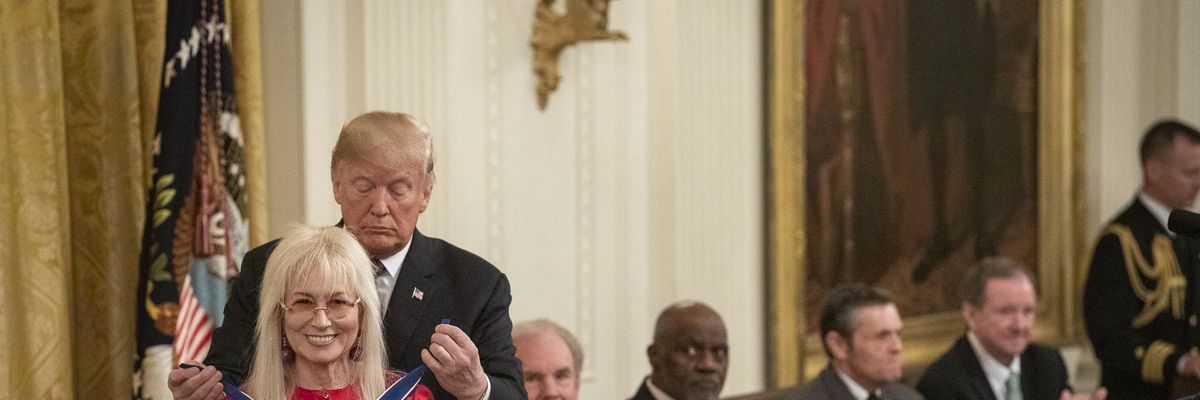Over the past three months, the Trump administration swung between applauding China’s handling of the coronavirus outbreak, playing to a xenophobic audience by amplifying the labels “China Virus” or “Wuhan Virus,” and pushing U.S. diplomats to accuse Beijing of engaging in a “cover up” and spreading disinformation about the virus’s origins, all before returning to praise Chinese President Xi Jinping for his leadership during the crisis.
That discordant message is consistent with the sharply contrasting postures toward China held by several of Trump’s most influential supporters. Some fund efforts to use the coronavirus to advance a confrontational agenda against China, while others with lucrative business interests in China and close ties to Beijing’s political elite have a more nuanced approach.
Hedge fund mogul Robert Mercer, who contributed $15.5 million to groups supporting Trump’s 2016 presidential campaign, plus undisclosed sums to finance the pro-Trump Breitbart news outlet, consistently funded groups that blame Beijing for many of the world’s — and the U.S.’s — problems, including the coronavirus.
Secure America Now (SAN) — a group that ran a series of mock travel ads for France, Germany, and the U.S. propagating the Islamophobic theme that Muslims were overrunning the West — received $2 million from Robert Mercer in 2016, nearly one-quarter of the group’s budget that year.
SAN recently ran Facebook ads that feature fearmongering and bellicose statements like, “Put the Chinese Communist Party on blast,” and “Don't let our prescription drugs be held hostage by China.”
Emails from the group to its followers include statements like, “For months now, the Communist government in China has done nothing but lie and try to shift the blame for the global coronavirus pandemic,” “China is directly responsible for the scale of this global pandemic,” and “Right now, as the coronavirus wreaks havoc in our communities, it’s absolutely critical to spread one simple message: CHINA LIED AND PEOPLE DIED.”
Trump’s former chief strategist Steve Bannon recently claimed on a SAN podcast “the devastation, not just human lives which has been horrible, but the devastation economically, the devastation on capital markets will literally take us 10 years, it will take us a decade to go through the carnage that the Chinese Communist Party visited on the rest of the free world.”
Breitbart, of which the Mercers are part owners, amplifies similar messages, promoting the “trending” topic “Communist China,” alongside various coronavirus related topics, at the top of its homepage. Articles in the website’s “Communist China” section include: “Jeff Landry: ‘If You Want to Lay Blame’ for Coronavirus, ‘Point Fingers at China’,” “Nolte: Chinese Propaganda Quotes Hillary, Chris Cuomo, Richard Engel to Rip Trump;” “Cruz: ‘Plausible’ Coronavirus Came from a Lab in China;” and “West ‘Reaping the Whirlwind’ for Policy of Kowtowing to China.”
Robert Mercer’s daughter, Rebekah Mercer, serves on the board of the Gatestone Institute and the family’s foundation provided at least $250,000 the group, led by former national security adviser John Bolton, which promotes fake news stories advancing anti-Muslim conspiracy theories.
Over the past two months that focus on promoting false stories about a Muslim takeover of Europe and the U.S. was supplemented by a steady flow of strikingly anti-China articles. Recent Gatestone articles include: “China Using Coronavirus for Further Deceit;” “The West Needs to Wake Up to China's Duplicity;” “The Vatican Surrenders to China;” “China's Real Disease: Not Coronavirus;” and “Tibet: The Pointless Pursuit of Dialogue with China.”
While the Mercers support groups and media outlets attempting to use the coronavirus to promote anti-China sentiments, other key Trump supporters have spent years investing in close ties with China’s leadership and cultivating lucrative business opportunities in China and Macau, a Chinese Special Administrative Region (SAR).
Trump and the GOP’s biggest financial supporter in the 2016 and 2018 political cycles, Sheldon and Miriam Adelson, tie their nearly $30 billion fortune to Sheldon Adelson’s Las Vegas Sands Corporation, a publicly traded company that owns and operates casinos in the U.S., Singapore, and Macau.
Adelson, who serves as CEO of Sands, derives two-thirds of his company’s revenue from gamblers in Macau, a gaming market that necessitates close ties with political elites in Beijing, especially as Sands’ gaming license is up for renewal in 2022.
Sheldon Adelson has a history of using his ties to U.S. politicians to shape U.S. foreign policy towards China to benefit his gambling empire. In 2001, Adelson reportedly curried favor with the Chinese leadership and helped secure his initial casino license in Macau by persuading Rep. Tom Delay (R-TX), then the House majority whip, to halt a bipartisan resolution calling for the U.S. to oppose Beijing’s Olympics bid due to China’s problematic human rights record.
Adelson appears to have only deepened his ties with Beijing since. In 2015, Sands appointed Wilfred Wong the new CEO and President of Sands China, a subsidiary of Las Vegas Sands.
Sands China’s press announcement of Wong’s appointment emphasized his ties to political leadership in Beijing. It said:
“Mr. Wong also served in many positions appointed by the Central People's Government: as a member of the Hong Kong Basic Law Consultative Committee; member of the Preliminary Working Committee and subsequently the Preparatory Committee responsible for establishing the Hong Kong Special Administrative Region. Mr Wong was also elected a member of the National People's Congress of the People's Republic of China for 15 years from 1997 to 2012.”
Adelson himself was also quoted in the press release, saying, "Wilfred has a unique combination of private and public sector experience we think will be invaluable to the company at this point in our history.”
In November, Sands China “led a delegation to Beijing Nov. 19 for a week-long professionalism training session, attended by 20 of Sands China’s senior management team members,” according to a Sands China press release, highlighting how Sands China’s leadership was educated in Beijing’s policies and urged to incorporate the central government’s agenda into their work for Sands China.
“We hope the team members who participated gained a more comprehensive understanding of the central government’s policies, such as the new implementation of the ‘One Country, Two Systems’ principle, the development of the Guangdong-Hong Kong-Macao Greater Bay Area, and its National Economic Strategy, so that they can seize the opportunities brought about by these key national developments, thereby enhancing their overall competence,” said Wong in the press release.
Adelson, for his part, warned Trump about the economic and political dangers of an escalating trade war with China in September. Adelson received personal thanks from Trump during remarks delivered at the signing of a “phase one” trade deal with China in January.
Stephen Schwarzman, the CEO of the Blackstone Group, a global private equity firm, also received thanks. “Steve has done a great job and very good relationship with China and very good relationship with us,” Trump said.
Schwarzman, sometimes known as Trump’s “China whisperer,” didn’t contribute to Trump’s 2016 campaign but the two Manhattanites have a social relationship going back over 40 years, and Blackstone’s $312 million loan to Kushner Co.’s, a company owned by the family of Trump’s son-in-law, Jared Kushner, “around the time of the Republican National Convention,” according to The Washington Post, firmly plants him in Trump’s orbit.
In late March, Politico reported that Schwarzman was one of the key voices urging Trump to maintain a good relationship with China and to help preserve the two countries’ economic relationship. Blackstone and Schwarzman enjoy lucrative business ties to China’s political elite. In 2007, a Chinese government-controlled investment fund took a 9.9 percent stake in Blackstone for $3 billion. Schwarzman boasted to Bloomberg News that the deal was so large, he was told “[t]he premier himself must approve” it.
The Chinese eventually sold their shares in Blackstone, but Schwarzman maintained close ties to Beijing, including giving $117 million to the Beijing campus of Tsinghua University and raised more than $400 million to endow a masters program named after him.
At the program’s September 2016 inauguration, Schwarzman delivered remarks in which he praised U.S. and Chinese leadership (including Secretary of State John Kerry, then-President Barack Obama and Chinese President Xi), joked about his reputation as the “unofficial Chinese ambassador to the U.S.,” and offered his view of how Chinese-U.S. relations can grow.
“I’m told that there is a Chinese proverb that encapsulates the transformative power of education,” said Schwarzman. “If you want one year of prosperity, then grow grain. If you want 10 years of prosperity, then grow trees. But if you want 100 years of prosperity, then you grow people.”
As Trump swings between blaming China for the growing COVID-19 death toll in the U.S. and uncritically praising Beijing’s early handling of the virus’s initial outbreak in Wuhan, the people with regular access to the president are offering their views on how the administration should respond to the pandemic and how much blame to place on China. Based on their many years of advocacy, political engagement, and business interests, the Mercers, the Adelsons, and Schwarzman are, no doubt, offering sharply conflicting advice about how Trump should respond to COVID-19’s Chinese origins.
















